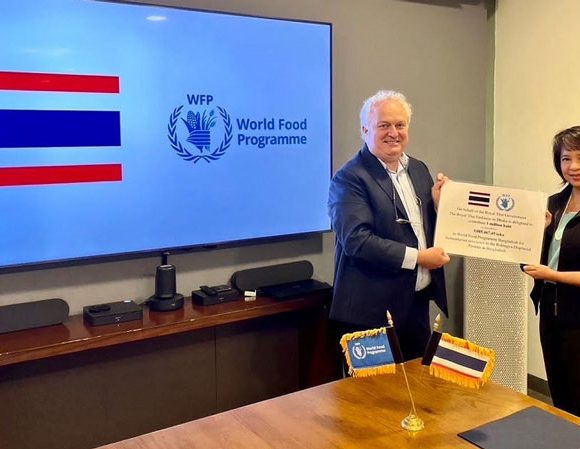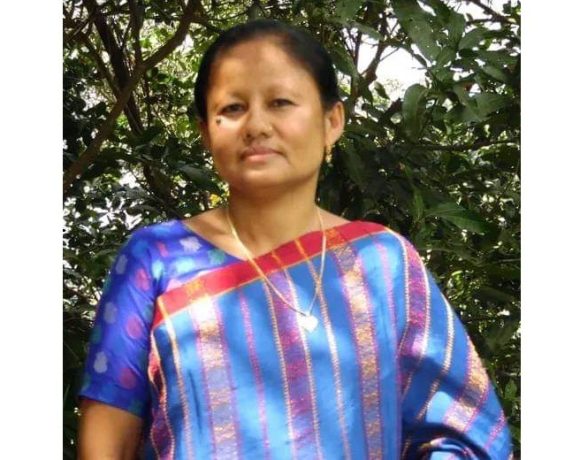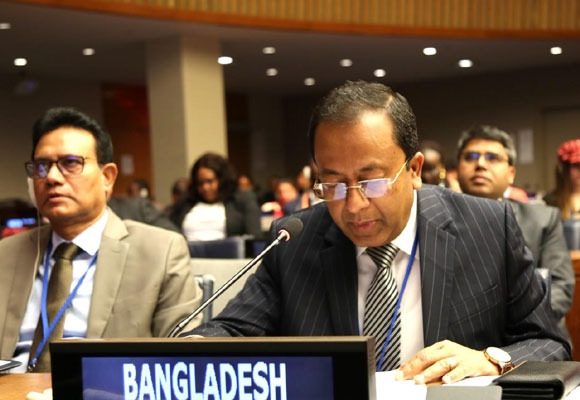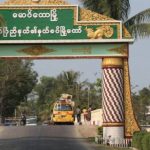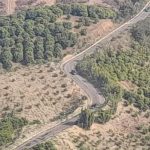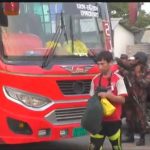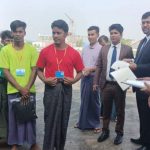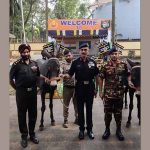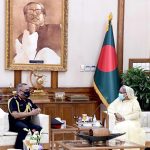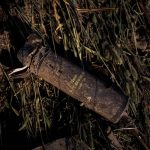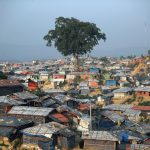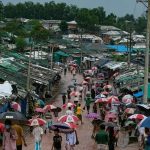CHT Peace Accord has done wonders: Bir Bahadur Ushwe Sing reflects on its 25 years
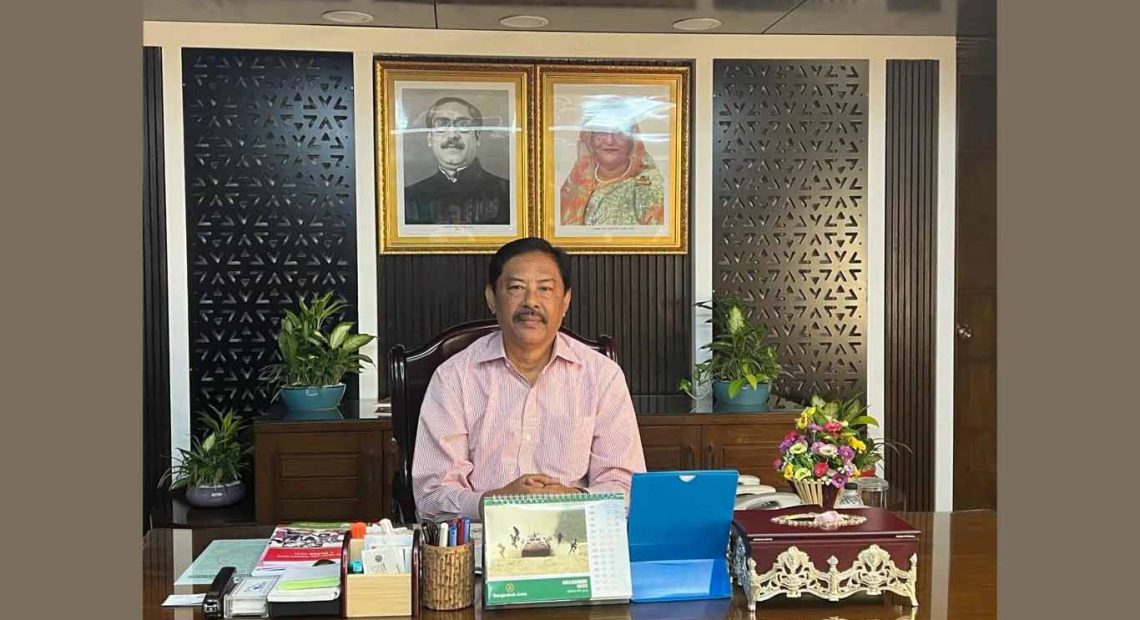
MEHADI HASSAN PALASH
On the occasion of the 25th anniversary of the Chittagong Hill Tracts Peace Accord, Chittagong Hill Tract Affairs Minister Bir Bahadur Ushwe Sing MP recently spoke to Mehadi Hassan Palash, editor at Parbatta News, at his ministry office in Dhaka. He elaborated on the various parts of the accord and the current unstable situation in the hill tracts. He mentioned the extensive development activities taking place in the Chittagong Hill Tracts as outcomes of the Peace Accord, demonstrating the prime minister’s commitment to the region.
Following are excerpts from the interview:
Parbatta News: In 1997, after a lengthy process, a peace accord was signed. In what circumstances was the accord signed?
Bir Bahadur Ushwe Sing: First, I must remember Bangabandhu Sheikh Mujibur Rahman. After independence, he visited the Chittagong Hill Tracts several times. Seeing for himself the conditions in the hill tracts, he thought of advancing the region anyway. Bangabandhu had a massive development plan for the hill tracts, including arranging for the proper education of the children in the region and involving them at the national level. Unfortunately, we lost him in 1975.
After Bangabandhu’s death, it is well known how the condition was all over the country. There was no rule of law anywhere in the country, not to mention the condition of the hill tracts. Successive governments took initiatives to address the issues in the hill tracts, but they failed because they could not even identify the issues plaguing the region. In the run-up to the 1996 elections, Prime Minister Sheikh Hasina identified the issues and promised the hill tracts people that she would see to their issues, and the hill tracts people also trusted her as a guardian.
“You don’t understand the pain of losing a mother, father, or loved one…. as much as I do,” she once told us before the 1996 elections. “If we come to power, we will solve many problems in the country, including those in the hill tracts. I will give priority to solving the problems of the hill tracts and restoring peace, as well as dealing with other problems in the country…. This is our political problem. We have to deal with it politically or solve it politically.”
As the Awami League – she leads – formed the government in 1996, work started on solving the problems facing the hill tracts. Those agitating in the hill tracts were contacted. We were finally able to come to a decision after meeting with them 10 to 12 or 13 times. It was all done at the instructions and with the knowledge of Prime Minister Sheikh Hasina. We, both parties—they and us—reached a compromise for the restoration of peace and harmony in the region, and, more importantly, for the overall development of the country.
We started working under his leadership. After gaining the trust of the hill tract agitators, we, both parties, signed an agreement on December 2, 1997, which we call the Peace Accord. Now it is 25 years since the accord.
Parbatta News: Jana Samhati Samiti (JSS) chief Santu Larma often says that there were some unwritten terms of the peace accord. Was there any such thing at all? If so, what were they?
Bir Bahadur Ushwe Sing: I was mostly with him. I don’t know if there was any such term or not. Because sometimes small committees used to sit separately on different issues, we might not have been there. But if there was such an unwritten term, then we would have heard something. I don’t know if there was any such. So, I can’t say anything about it with emphasis on whether they were anything like that or not.
Parbatta News: What are the achievements of 25 years of the peace accord?
Bir Bahadur Ushwe Sing: You know that too well. Because you are also experienced, you have a presence in every field of the hill tracts, you have done the research, you write a lot; you have mentioned them in your research and writeups. Roads, bridges, culverts, and agriculture have all undergone massive development. All 26 Upazilas and hilly areas have electricity connections. If compared before and after the Peace Accord, it would show how much development there has been in the hill tracts.
If you look at education, you will see many things; if you look at jobs, you will see many things: educational institutions, and roads. Let me give you a small example of the Bandarban district: an area like Thanchi had no college, no electricity, no roads, no communication system, and no place to sell crops if people did any agricultural work. There was only a private high school. Schools were not running, but now schools are running, girls have been schooled, and colleges have been set up. A hospital with 50 to 80 beds has been built there. A fire station has been built. Electricity has made it there. In addition, we are providing electricity to the areas where electricity has not been reached, through the solar system, at no cost. At one time, a hand of bananas was not sold for even Tk 10–20, but now it is being sold for Tk 500–700. People are becoming financially solvent. They are progressing in every field of education. These things are happening because of the peace accord.
We have actually made progress in all areas of the hill tracts. Many times, many people say that the peace accord has not been implemented. Most parts of the peace accord have been implemented. But there are some things left, which are ongoing. Moreover, the important thing is that the implementation of the peace accord has not stopped. It is going on. The implementation of the accord will just be taken forward upon mutual discussion.
As a result, I believe the main goal of this accord is for all residents of the hill tracts to be able to live with the right to preserve their own language and culture; the accord was signed with the idea that religion is for all while the state is for all of us. For higher education, a science and technology university has been established in our hill region. There is a medical college and an engineering college in Khagrachhari. We have colleges in every Upazila. These are successes of the accord.
In agriculture, we are planning mixed orchards. There, coffee and cashew nut cultivation projects have been taken up, and sugarcane cultivation projects have been taken up. Arrangements have been made to distribute cows so that women can earn income at home. Bamboo saplings have been distributed to promote handicrafts. In addition, the government has other initiatives. The Prime Minister has directed the establishment of residential schools in outlying areas. We can make schools residential so that children from remote areas can come and stay there. They will be able to read and write better under the care of teachers, and their suffering will be less. That’s how we are proceeding.
You have already seen that the Prime Minister inaugurated 100 bridges across the country. Among them, he inaugurated 42 bridges in Khagrachhari alone. A lot of such development work is going on, and apart from the Chittagong Hill Tracts Ministry, all the other ministries are still carrying out development work worth about Tk 9 to 10 thousand crores in the hill tracts. Among them, the army is paving roads, LGED is working, the development board is working, the agriculture department is working, and the education department is working. There are three Zilla Parishads; there is also the Chittagong Hill Tracts Regional Parishad, and they are all doing various developmental activities. The CHT ministry is overseeing them.
Parbatta News: Do you believe the government prioritizes Chittagong Hill Tracts over the other 61 districts in the country? Due to the sincerity of the government, more allocations are going to the hill tracts.
Bir Bahadur Ushwe Sing: Yes, I saw it when I took over the ministry or even before that. The development budget was around Tk 100-200 crore at the time. It has now surpassed a thousand crores. It is being given not only under the Ministry of Chittagong Hill Tracts but also under other ministries. Thousands of crores of development work is being done there across all ministries. So, development has just begun. There will be many more developments. I think there is no alternative to Prime Minister Sheikh Hasina for harmony, development, and peace in the hill tracts. However, there may be some problems while doing these tasks. They may change over time.
Parbatta News: JSS has repeatedly alleged that the peace accord has not been implemented. The government is not sincere in the implementation of the peace accord. What is your opinion in this regard?
Bir Bahadur Ushwe Sing: We have implemented about 65–66 clauses out of the 72 clauses of the accord. Implementation of six clauses is in progress.… Therefore, it is not true that the accord has not been implemented. If there was no implementation of the accord, how did the regional council come about? How did the hill tract ministry come about? If not implemented, then how are primary school teachers appointed through Zilla Parishad? How are the development of roads, and the rehabilitation of the returned members of the Shanti Bahini taking place in the hill tracts?
Parbatta News: A peace accord was signed between the two sides – the government and the JSS. The accord has 72 clauses, one of which states that JSS shall surrender their weapons and return to normal life. But we still see that JSS has weapons. They are using weapons. So far, they have not implemented even one of these clauses. Are you putting emphasis on this issue?
Bir Bahadur Ushwe Sing: According to the terms of the peace accord, all the firearms were deposited on the day they surrendered at the Khagrachari stadium. They are back to normal life. So, the ones that are seen now are certainly not legitimate, they are illegal. Due to this, the people of the hill tracts demand that illegal weapons be recovered as soon as possible. …. The government appealed to the government to take legal action against those illegal firearms holders and speed up the development and progress of the region.
Parbatta News: Then you want to say – they should get back on the development track. We see that many people are trying to leave their weapons and return to normal life to join the development trend that has taken place in the hill tracts or to join the main political trend. But because of this, many have been killed and persecuted. Bangladesh Awami League has been in power for three consecutive terms, but it appears that those who want to be involved in the politics of Awami League, those who want to be involved in the politics of development, are being killed in Chittagong Hill Tracts. Why can’t you ensure their safety in this case?
Bir Bahadur Ushwe Sing: It is better if the government knows about an incident before it happens, not after it happens. As soon as the government knows about it, it takes action to deal with the terrorists or the incident. Due to that, the people of the three hill districts do not support any terrorist organization or terrorist. As you have seen, because they don’t like it, they have repeatedly given opportunities to Awami League leaders to lead in three districts. Because the people of the hill tracts are very peaceful. They do not like firearms, and they are not dependent on firearms, nor have they ever supported illegal arms holders. That’s why they killed those who do Awami League politics out of hatred; they were the leaders of our party. We condemned it. Legal action is being taken. I hope that those who are involved in such crimes will come to their senses because that will give them peace. I would call for them to shun such crimes for the purpose of which we have signed the accord, for the purpose of which we have united. If we all hold hands together and love our region, if I have a sense of responsibility as a conscious citizen, and if we all work together, then this kind of weaponry will not be necessary. The Prime Minister wants the development of this region, we are working as per the Prime Minister’s plan. Moreover, the peace accord has not been fully implemented…. its implementation is going on. Hopefully, both parties can work it out together.
Parbatta News: What do you think needs to be done to ensure peace and development in the Chittagong Hill Tracts?
Bir Bahadur Ushwe Sing: I think public awareness needs to be created. We need public awareness. People should be made aware of law and order, regarding development. We have spoken to the Headman, Carbari, Public Representative, Chairman, Member, and the general public so that they are all united for the development of the region, and we will never support terrorist-attackers. No one should ever give them shelter. Everyone should work hand in hand, shoulder to shoulder, to continue the ongoing development activities of the government in the region. Besides, the members of the law and order enforcement agencies are doing what is necessary to protect law and order in the region. I express my thanks and gratitude to them for fulfilling their responsibilities amid the adverse conditions of the hill tracts.
Parbatta News: Thank you.
Bir Bahadur Ushwe Sing: You are welcome.

